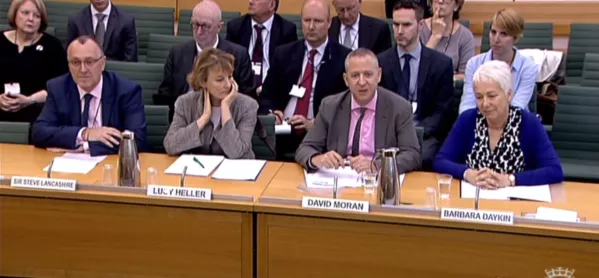Chief executives of academy chains and leading education figures outlined their vision for the future of the multi-academy trust (MAT) system in Westminster. Here’s what we learned:
- Trusts were encouraged to grow “too fast” in the past
David Moran, chief executive of E-Act, which has 23 academies, said that one of the key mistakes that had led to the trust’s “historic failure” before he joined was speed of growth.
Meanwhile, Lucy Heller, chief executive of Ark, which has 34 schools, said the Department for Education had played a role in encouraging “speedy growth”, which had led to some trusts growing “too fast”.
- There’s a lack of clarity over what size is most effective
Russell Hobby, general secretary of the NAHT headteachers’ union, argued that the best size for school improvement was between six to 12 schools - but the other witnesses were not as specific.
Chris Keates, general secretary of the NASUWT teaching union, said it was “too variable” to give a number, while Emma Knights, chief executive of the National Governors’ Association (NGA), said the focus should be on pupil numbers instead.
But it’s clear that some MAT bosses are wary of expansion. Sir Steve Lancashire, chief executive of Reach2 academy trust, which is responsible for 53 primary schools, said the chain decided to establish a new trust in the South, instead of expanding the exisiting one, to reduce the risks.
- Academy trust chiefs agree that Ofsted should inspect MATs
All four MAT leaders - including Barbara Daykin, executive head of Little Mead Academy Trust - believe that Ofsted should inspect trusts.
Currently, individual academy trusts are not inspected - but MAT bosses would welcome being held more accountable. Ms Heller told MPs she was in favour of “there being a MAT focus in Ofsted inspection”.
Mr Hobby added that he thinks there should be a tiered system for inspection.
- Parents need to play a greater role in the MAT system
Neil Carmichael, chair of the Commons Education Select Committee, and Ms Knights both called for a system where parents could challenge a MAT.
The NGA chief executive urged for parents to be on boards, claiming that they could help to make “stronger and better decisions”. Ms Daykin, who has two school in her trust, added that parent governors were “key”.
- Tight regional clusters can help - but trusts also need to help each other
Sir Steve argued that it was “very important” for schools to be in local clusters. Meanwhile Mr Moran said that regional clusters played a key role in sharing “capacity and best practice”.
But both the Reach2 and E-Act bosses said there should be more sharing and learning between successful MATs and other trusts - including peer reviews.
Mr Moran added that he was hopeful that plans for the national schools commissioner Sir David Carter to have direct control over the largest MATs - those with 30 schools or more - might enable “more collaboration” between these trusts.
Want to keep up with the latest education news and opinion? Follow TES on Twitter and like TES on Facebook
